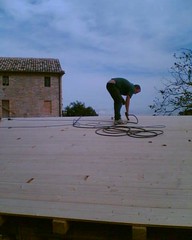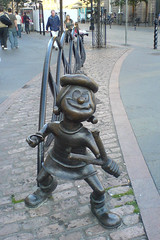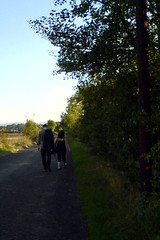Said I'd paste up the sequel to my
Dr Who tour of London. So here it be:
Start the day at
St Paul's cathedral, again as early as possible. It's huge, and built to the classical Roman proportions of 1:1.6. This means it's a bit bloody sturdy – when a German was bomb was dropped right on top of it, it only ruined some furniture. (See
The Time Travellers, chapter four).
Coming out of the main entrance of St Paul's, turn left and follow the building round until you can see the signs for the
Millennium Bridge and
Tate Modern.

Head that way. You're walking down the famous Cybermen steps from
"The Invasion". Two things to note:
- The pub on your right (which the Cyberman also troop past) is on Knightrider Passage.
- The bridge across the river is only six years old. Where did the Cybermen think they were going?
Cross the bridge. It's cool. Tate Modern used to be Bankside Power Station, and is now a big art gallery. It and the bridge also feature prominently at the beginning of the (very good) Dr Who novel
"The Tomorrow Windows" – it's inside Tate Modern we get the very first glimpse of Eccleston's Dr Who.
Head left along the river, past the modern reconstruction of the Globe Theatre, where Shakespeare did his thing.
"The Kingmaker" has at least two Drs Who in the original, and this new version was the pet project of The Lady Cassandra's dad, Sam.
(ETA: And the new series just filmed there for
one of next year's episodes.)
Keep going along the river, and when you pass
Vinopolis and the
Clink prison, you're in the bit from the
Talons of Weng Chiang. Filming in 1977, they asked residents to move the cars so as not to spoil the period setting. And some git parked a Porsche in the middle of the street. In the episode, it's what's under the Porsche-shaped horse poo.
Keep going, maybe having a peek into
Southwark Cathedral which is pretty. Also the big church south of the river you'll see in anything set in Olde Londone (for example, the lovely model shot at the beginning of the
Olivier "Henry V").
Next to Southwark Cathedral is a smallish covered area which hosts
Borough Market on Saturdays. All sorts of very good food is here, though it's crowded and costly. You can celeb-spot. Apparently David Hasselhoff comes here to buy elk. Celeb-mail
Popbitch reported once how someone had accosted the Hoff here with the words, "You're nothing without your robot car!"
Keep going. The river-crossing bridge up next is a bit dull, innit? That's
London Bridge. There's been a bridge here since Roman times, and for many centuries the bridge had two rows of houses on it. The arches holding the bridge up were so close together that they slowed the Thames right down, which meant it froze in winter. They used to have festivals on the ice. There was so much traffic on the bridge that bits of it used to fall off into the river. Hence the song.
[ETA: See Nimbos's comments below.]
Until only a few decades ago, London Bridge looked a lot more impressive. But then some rich American bought it to put in a lake in Arizona, and this one's a quick replacement. The rich American's wife played Dr Who's niece Louise in the
second Peter Cushing movie.
Cross over the road (still following the south side of the river) and head down the hill into Tooley Street. You pass by London Bridge station on your right. There'll be a big queue outside the
London Dungeon, which has lots of waxwork recreations of various historical torturings, and a groovy mirror maze.
Keep going down Tooley Street. Soon after the mayor's new offices on your left, there's a bit of green space called Potter's Field. This is, importantly, where the opening moments of
"The Coup" took place.
Potter's Field leads you up to
Tower Bridge. Duck under Tower Bridge and go have a look at Shad Thames – the tall buildings on the other side. They're very smart and expensive now, but in 1984 were so run down no one minded if
Peter Davison pushed a Dalek out the window.
Back on to Tower Bridge, then, and cross the river. The bridge was built in 1894 (so is a lot newer than most Londoners think). I recommend the museum, which lets you go up to the top. Top fact: Peter Cushing's last movie role was in
"Biggles", when - for no very good reason - he lived inside one of the bridge's towers.
Head down the steps at the north end of the Bridge, and follow it round the back of the
Tower of London, getting a look at the Roman remains they've dug up. As well as being the UNIT HQ in
"Christmas Invasion", the Tower is a major setting in Big Finish's
"Marian Conspiracy" and
"Jubilee".
The square keep in the middle of the complex was built soon after the Norman conquest in 1066 (so is the earliest castle of it's type in the country), as part of the "harrowing" of anyone who didn't like French rule. Going in is expensive and involves lots of queuing, but is well worth the trouble. You also get to see the crown jewels - and thus what happened to that big diamond from
"Tooth and Claw". The tea shop will also do you nicely for lunch.
When you're done with the Tower, head west along the riverbank, away from Tower Bridge. When you get to the north end of London Bridge, head away from the river for a look at the
Monument. It's a whopping great pillar with a golden sculpture perched on top, and commemorates where they think the Great Fire of London began in 1666. Yes, you're in that little square from the end of
"The Visitation".
From there, head up King William Street (north west, following signs for Bank station), and you'll get to the
Bank of England – the first bank (as we understand the term) in the world. Here, in the age of Isaac Newton, some clever blokes worked out how to make two plus two equal eight.
(ETA: See Liadnan's comments, below.)
You'll notice that the entrances to
Bank underground station (where
yesterday's tour began) are all over everywhere round here. This is because the original main entrance had a bomb fall on it in January 1941 – which killed 56 people sheltering inside. The modern entrances are converted from the access shafts dug soon after the bombing.
Head down Cheapside towards St Paul's, but take a right onto King Street and make your way to the
Guildhall. It's a pretty ugly, modern building, but they recently discovered that it's built on top of what used to be the Roman amphitheatre. Which is cool.
[ETA: Following Liadnan's comments below, thr Guildhall itself is medieval, but it's buttressed by ugly, modern building which is the bit Nimbos and I were unimpressed by in last year's
London Open House.)
Head due west from there down Gresham street, and you'll emerge onto St Martin's, with the big cathedral to your left.
On your right (on the roundabout) is the
Museum of London, which will tell you lots of top facts about all the places I've just had your traipse through. Just before you get to the museum, though, there's a cut-through on your left called "Little Britain", which is also the name of
a TV show narrated by Tom Baker.
Little Britain is intersected by a main road, King Edward Street, and looking left down it you'll see a big statue of
Rowland Hill, the top Victorian who – amongst other clever things – invented the postage stamp.
Carry on through Little Britain, passing
St Bart's Hospital on your left. (It's obviously no relation to the St. Gart's Hospital where Dr Who's friend Hex works). Key scenes in my Dr Who book happened in this bit of alleyway. Look out for the small nook on your right leading to St Bart's chapel. It's beautiful.
The great big
Smithfield meat market sits at the end of Little Britain. It was built here so that the juices of dead animals could flow into the nearby river
Strand Fleet (I am an idiot). Which got so clogged with offal and nastiness that they built over the top of it. The meat market is also built on top of one of the city's old execution sites. Wander round the outside of the market until you find the commemoration to William Wallace (Mel Gibson in
Braveheart. That's almost a Dr Who reference.)
Head through the market, passing the line of red telephone boxes which you might want to take pictures of if you're feeling touristy. Depending what day of the week you're doing this, there may be butchers in their white overalls wandering about, but the path through the market is a public right of way.
You're now in a little square with St John Street heading north. Follow it over the (busy) Clerkenwell Road, and then turn left into the pretty
Clerkenwell Green, where there are nice little pubs, cafes and eateries. Pretty, isn't it? This is where Dogder taught
Oliver Twist how to pick-a-pocket-or-two.
When you've had whatever refreshments you require, head west out of Clerkenwell Green, cross back over Clerkenwell Road, and head down Turnmill Street. At the end, turn left and you'll see Farringdon Tube Station. There are two very good bookshops just a minute's walk the far side of the station, if you've still got any give in your feet.
 And then Mars Attacks!, which I now realise is a great lodestone to my scribbling.
And then Mars Attacks!, which I now realise is a great lodestone to my scribbling. 












